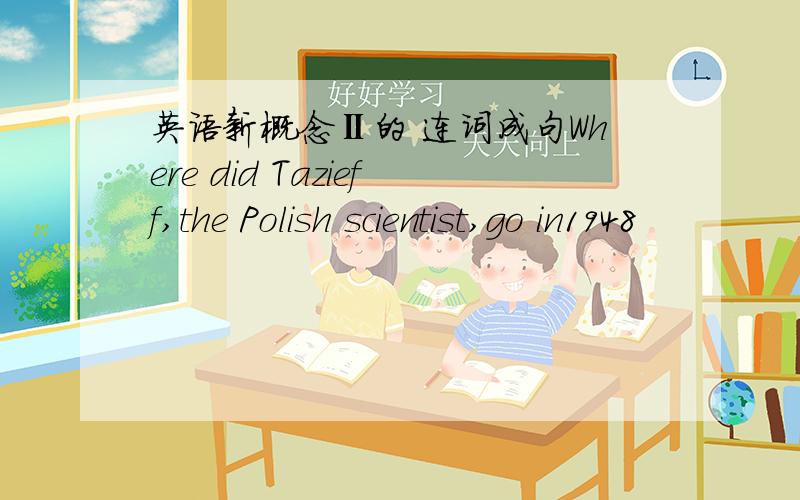英语新概念Ⅱ的 连词成句Where did Tazieff,the Polish scientist,go in1948
来源:学生作业帮 编辑:大师作文网作业帮 分类:英语作业 时间:2024/11/17 06:10:26
英语新概念Ⅱ的
连词成句
Where did Tazieff,the Polish scientist,go in1948?Why did he go there?What did he call it?(to...which)
Did he take photographs or not?Did he have to leave almost at once or not?Did a river of liquid rock threaten to surround him or not?Did a river of liquid rock threaten to surround him or not?(After taking...because)
Did he escape just in time or not?When did he return?Had the wolcano become quiet,or was it still active?(but...when)
Where did he climb this time?Why did he do so(in order to)
连词成句
Where did Tazieff,the Polish scientist,go in1948?Why did he go there?What did he call it?(to...which)
Did he take photographs or not?Did he have to leave almost at once or not?Did a river of liquid rock threaten to surround him or not?Did a river of liquid rock threaten to surround him or not?(After taking...because)
Did he escape just in time or not?When did he return?Had the wolcano become quiet,or was it still active?(but...when)
Where did he climb this time?Why did he do so(in order to)

1.Where did Tazieff,the Polish scientist,go in1948?Why did he go there?What did he call it?(to...which)
Tazieff,the Polish scientist,went to Lake Kive in the Congo in 1948.
He went there to observe a new volcano.
He called it Kituro.
Tazieff,the Polish scientist,went to Lake Kivu in the Congo in 1984 to observe a new volcano which he called Kituro.
2.Did he take photographs or not?Did he have to leave almost at once or not?Did a river of liquid rock threaten to surround him or not?Did a river of liquid rock threaten to surround him or not?(After taking...because)
He took photographs.
He had to leave almost at once.
A river of liquid rock threatened to surround him.
After taking photographs,he had to leave almost at once because a river of liquid rock threatened to surround him.
3.Did he escape just in time or not?When did he return?Had the wolcano become quiet,or was it still active?(but...when)
He escape just in time.
He returned two days later.
The volcano had become quiet.
He escaped just in time but he returned two days later when the volcano had become quiet.
4.Where did he climb this time?Why did he do so(in order to)
This time he climbed into the mouth of Kituro.
He did so in order to take photographs and measure temperatures.
This time he climbed into the mouth of Kituro in order to take photographs and measure temperatures.
Tazieff,the Polish scientist,went to Lake Kive in the Congo in 1948.
He went there to observe a new volcano.
He called it Kituro.
Tazieff,the Polish scientist,went to Lake Kivu in the Congo in 1984 to observe a new volcano which he called Kituro.
2.Did he take photographs or not?Did he have to leave almost at once or not?Did a river of liquid rock threaten to surround him or not?Did a river of liquid rock threaten to surround him or not?(After taking...because)
He took photographs.
He had to leave almost at once.
A river of liquid rock threatened to surround him.
After taking photographs,he had to leave almost at once because a river of liquid rock threatened to surround him.
3.Did he escape just in time or not?When did he return?Had the wolcano become quiet,or was it still active?(but...when)
He escape just in time.
He returned two days later.
The volcano had become quiet.
He escaped just in time but he returned two days later when the volcano had become quiet.
4.Where did he climb this time?Why did he do so(in order to)
This time he climbed into the mouth of Kituro.
He did so in order to take photographs and measure temperatures.
This time he climbed into the mouth of Kituro in order to take photographs and measure temperatures.
英语新概念Ⅱ的 连词成句Where did Tazieff,the Polish scientist,go in1948
did,children,go,the,where,last,weekend连词成句
weekend,where,you,did,on,go,the,)连词成句
you,on your holiday,where,go,did连词成句
you where on holiday your go did连词成句
连词成句:go,she,vacation,on,where,did
did,he,last,where,go,weekend(连词成句)
连词成句did your where you go on holiday
go did Lingling where yesterday?连词成句
where,did,last,weekend,go,you怎样连词成句?
Lingling did yesterday Where go 连词成句
连词成句:yesterday where they did go oldest